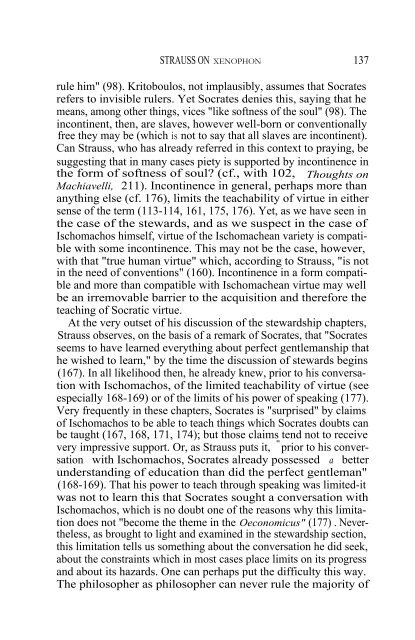Strauss on Xenophon's Socrates Xenophon's Socratic Discourse: An ...
Strauss on Xenophon's Socrates Xenophon's Socratic Discourse: An ...
Strauss on Xenophon's Socrates Xenophon's Socratic Discourse: An ...
Create successful ePaper yourself
Turn your PDF publications into a flip-book with our unique Google optimized e-Paper software.
STRAUSS ON XENOPHON 137<br />
rule him" (98). Kritoboulos, not implausibly, assumes that <strong>Socrates</strong><br />
refers to invisible rulers. Yet <strong>Socrates</strong> denies this, saying that he<br />
means, am<strong>on</strong>g other things, vices "like softness of the soul" (98). The<br />
inc<strong>on</strong>tinent, then, are slaves, however well-born or c<strong>on</strong>venti<strong>on</strong>ally<br />
free they may be (which is not to say that all slaves are inc<strong>on</strong>tinent).<br />
Can <str<strong>on</strong>g>Strauss</str<strong>on</strong>g>, who has already referred in this c<strong>on</strong>text to praying, be<br />
suggesting that in many cases piety is supported by inc<strong>on</strong>tinence in<br />
the form of softness of soul? (cf., with 102, Thoughts <strong>on</strong><br />
Machiavelli, 211). Inc<strong>on</strong>tinence in general, perhaps more than<br />
anything else (cf. 176), limits the teachability of virtue in either<br />
sense of the term (113-114, 161, 175, 176). Yet, as we have seen in<br />
the case of the stewards, and as we suspect in the case of<br />
Ischomachos himself, virtue of the Ischomachean variety is compatible<br />
with some inc<strong>on</strong>tinence. This may not be the case, however,<br />
with that "true human virtue" which, according to <str<strong>on</strong>g>Strauss</str<strong>on</strong>g>, "is not<br />
in the need of c<strong>on</strong>venti<strong>on</strong>s" (160). Inc<strong>on</strong>tinence in a form compatible<br />
and more than compatible with Ischomachean virtue may well<br />
be an irremovable barrier to the acquisiti<strong>on</strong> and therefore the<br />
teaching of <strong>Socratic</strong> virtue.<br />
At the very outset of his discussi<strong>on</strong> of the stewardship chapters,<br />
<str<strong>on</strong>g>Strauss</str<strong>on</strong>g> observes, <strong>on</strong> the basis of a remark of <strong>Socrates</strong>, that "<strong>Socrates</strong><br />
seems to have learned everything about perfect gentlemanship that<br />
he wished to learn," by the time the discussi<strong>on</strong> of stewards begins<br />
(167). In all likelihood then, he already knew, prior to his c<strong>on</strong>versati<strong>on</strong><br />
with Ischomachos, of the limited teachability of virtue (see<br />
especially 168-169) or of the limits of his power of speaking (177).<br />
Very frequently in these chapters, <strong>Socrates</strong> is "surprised" by claims<br />
of Ischomachos to be able to teach things which <strong>Socrates</strong> doubts can<br />
be taught (167, 168, 171, 174); but those claims tend not to receive<br />
very impressive support. Or, as <str<strong>on</strong>g>Strauss</str<strong>on</strong>g> puts it, " prior to his c<strong>on</strong>versati<strong>on</strong><br />
with Ischomachos, <strong>Socrates</strong> already possessed a better<br />
understanding of educati<strong>on</strong> than did the perfect gentleman"<br />
(168-169). That his power to teach through speaking was limited-it<br />
was not to learn this that <strong>Socrates</strong> sought a c<strong>on</strong>versati<strong>on</strong> with<br />
Ischomachos, which is no doubt <strong>on</strong>e of the reas<strong>on</strong>s why this limitati<strong>on</strong><br />
does not "become the theme in the Oec<strong>on</strong>omicus" (177) . Nevertheless,<br />
as brought to light and examined in the stewardship secti<strong>on</strong>,<br />
this limitati<strong>on</strong> tells us something about the c<strong>on</strong>versati<strong>on</strong> he did seek,<br />
about the c<strong>on</strong>straints which in most cases place limits <strong>on</strong> its progress<br />
and about its hazards. One can perhaps put the difficulty this way.<br />
The philosopher as philosopher can never rule the majority of

















